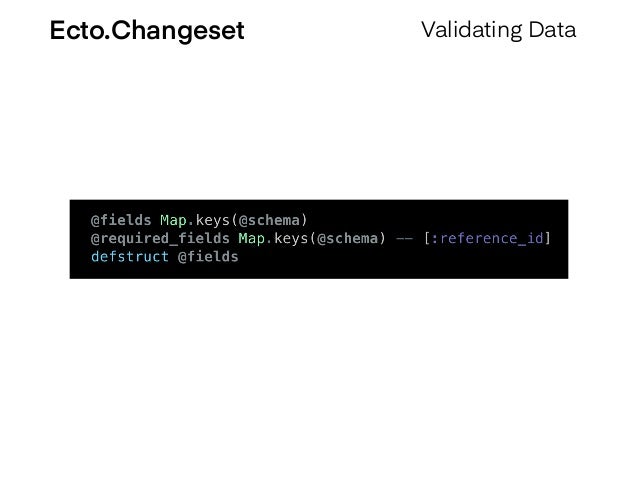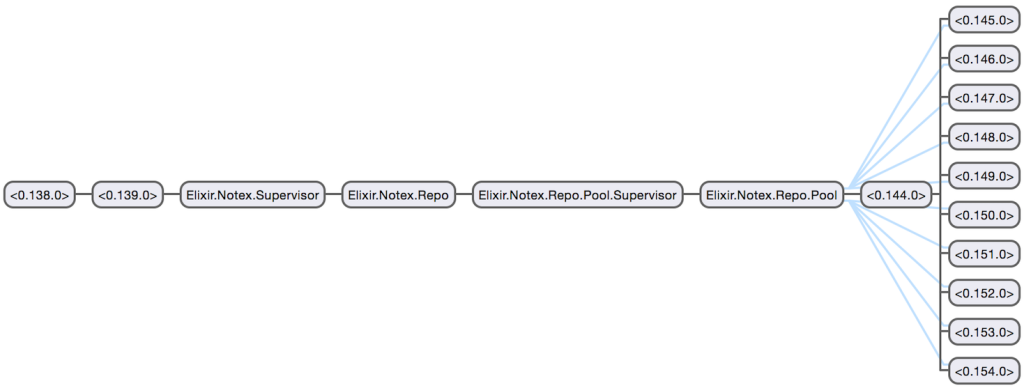

- #Elixir ecto changeset how to#
- #Elixir ecto changeset update#
- #Elixir ecto changeset series#
- #Elixir ecto changeset free#
SELECT a0."id", a0."name", a0."birth_date", a0."death_date", a0."inserted_at", a0."updated_at" FROM "artists" AS a0 WHERE (a0."id" = $1) Ģ0:50:37.038 QUERY OK db=6.7ms queue=0. /3 and /5 do perform a bulk insert, but they do not update calculated fields, like insertedat and updatedat, meaning one should prepare and fill them manually. Interactive Elixir (1.9.1) - press Ctrl+C to exit (type h() ENTER for help) It could be informative to see the generated SQL through an iex session ( example).Įrlang/OTP 22 PostgreSQL does support RETURNING on a detailed level (MySQL doesn’t seem to support it). It will always include all fields in read_after_writes as well as any autogenerated id. Ecto provides a number of functions for creating validations. When false, no extra fields are returned. Now that weve had a look at using change and cast to create changesets from IEx, lets create changeset functions in our schemas and add validations to them. It accepts a list of fields to be returned from the database. Here I want to look a little bit more deeply into the cast functions castembed and castassoc. :returning - selects which fields to return. In our previous post we took a little look at the differences between some common changeset functions in Ecto. I’ll check if my understanding above is wrong.) Glad to help In respect to your question - you could tackle that by extracting all validation rules to separate function (like validate), that would accept a changeset, which you could pipe through all validating functions, if that makes sense.The great thing about Elixir/Ecto is that you can compose whatever you need with plain functions. I’m betting I could affect whether timestamps were returned with :returning. (I picked a schema without timestamps, because it was the most convenient. This is the same result as happens with returning: true or returning. Reason: "before animal was put in service", name end withminimum (18, 5.0) When interpolating values, you may want to explicitly tell Ecto what is the expected type of the.
#Elixir ecto changeset series#
This post is part of my series of Elixir Tutorials
#Elixir ecto changeset free#
If you have any questions or have another tip, feel free to leave a comment below. Some will return the amount of rows updated (postgresql), others will return the amount of rows attempted to be updated or inserted (mysql), etc. (1)> changeset = (user, %) end)Īs stated in the documentation, insert_all/3 can return some cryptic values depending on the database/persistence layer you choose to use. defmodule Example.User doĬast(user, params, ) You can, of course, simply create changesets or structs for each row of data, group them together in something like a list, and then pass them all one-by-one using Enum.each/2 to /2. Well, there is, and in this post, I’ll show you how you can do it using Ecto without having to write a single line of SQL. What if there were a way to bulk update rows of data in your database using only ONE update call? schema 'applications' do field :name, :string belongsto :user, User, foreignkey: :userid. If you want to work with the binary representation directly, you can define the type as :binaryid. Create a function that makes use of the changeset to update the projects of a user. Ecto Schemas using binaryid expects the data to be a String formatted UUID, which is then converted to the 16 byte binary format by Ecto automatically.

Add new changeset to user module for editing projects (adding the putassoc/4) Step 4. Add manytomany relations in the Project and User module.

#Elixir ecto changeset how to#
But figuring out how to bulk update rows using Ecto without updating one record at a time? Create a migration that adds userproject table. In our case, ecto can convert our string to a date so we get the desired result. Updating one database row in Ecto is straightforward. The thing to take from this is takes the fields on the data and compares it to what the schema says it should be, then attempts to coerce it to that type if it can.


 0 kommentar(er)
0 kommentar(er)
